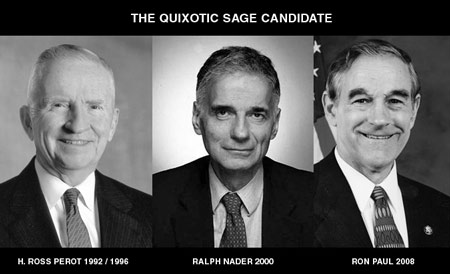During past presidential elections I have been swept away with a fever for politics. Like with many other people, it seemed to happen only during the presidential election cycle. For me, it was similar to how I ignore sports except during the playoffs. When everyone starts to care about the outcome, it is easy to join in and become excited.
Over time though, I grow more and more disinterested in politics. In 2004 and in this current election, I have been sitting on the sidelines, watching both factions battle it out for the quarterback position in American government. When you watch from a disinterested perspective, everything seems so vain and not a little bit ridiculous. Consider the kind of people who want to be president. They are either true reformers and leaders, who will never compromise enough to make it, or they are craven careerists, who will serve their benefactors. In either case, all outcomes are inconsequential. Our electoral system is such that we are guaranteed a president that most people will not care for. This is not necessarily a bad thing, but it tempers any interest in the outcome.
Anyway, with all the attention on the Internet about Ron Paul, I feel like we’ve been here before. It seems like every election there is a scrappy outsider candidate. A candidate with strong feelings and beliefs but with little chance of becoming president. These are the idealist candidates and they often appear in the form of a kindly grandfather figure with the gentle authority of wisdom and morality. The idealist candidates don’t have a prayer at getting elected, but becoming president is not their goal. Usually a vote for the idealistic outsider is a vote for the renunciation of politics. It is a vote for a world where things make sense.

They are good at stirring up emotions while inspiring and galvanizing people, but bad at resembling someone you would actually want as president. Can you imagine the bizarro universe in which Ross Perot, Ralph Nader, or Ron Paul actually became president of the United States? It would be entertaining for a while, but ultimately a train wreck. These candidates are good for people who dislike politics because they appeal to ideals rather than mundane realities. Idealists want to change the world, but they don’t really want to deal with the world on its own terms. Who can blame them?
i agree…one might put Gravel in there as well, although not as appropriate as Paul within the context of what you write above
Yea, I thought of Howard Dean, too, but he doesn’t have the grandfatherly thing.